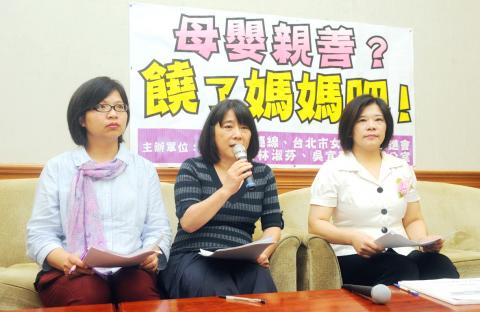Although mother-infant bonding programs in hospitals are aimed at allowing mothers to spend more time with their newborns, lawmakers and mothers yesterday urged more flexibility in the programs as they can become troublesome for mothers.
“When I gave birth to my second child, I stayed in a hospital that had a mother-infant bonding program. However, I left the hospital four days after giving birth, even though the National Health Insurance would have helped to cover five days’ stay,” Democratic Progressive Party (DPP) Legislator Lin Shu-fen (林淑芬) told a news conference on Mother’s Day yesterday at the Legislative Yuan. “You know why? Because I was too exhausted — both mentally and physically.”
To help develop a closer relationship between mother and child, mother-infant programs allow newborns to stay in the same room as their mothers for 24 hours a day, so that mothers can breastfeed their child anytime they desire, Lin said.

Photo: Wang Min-wei, Taipei Times
In an attempt to promote the practice, the Department of Health has made the implementation of the program part of hospitals’ performance evaluations.
“Although it is a well-intended program, I’ve received complaints from many mothers that the hospital would turn down their request to take their babies from them for a while, so that they may have a good rest,” Lin said. “I must say that, after labor, a mother does need a good rest to recover. Having the baby around 24 hours a day does not necessarily benefit the mother or the baby. A mother should have the right to choose what she wants.”
DPP Legislator Wu Yi-chen (吳宜臻) said that she was also disappointed by an inflexible mother-infant bonding program.
“I was at the edge of mental collapse after giving birth to my child because of the mother-infant bonding program,” she said. “I agree that the program is well-intended, but it must be implemented in a mother-friendly way to make sure that a mother gets enough rest while also enjoying taking care of her newborn baby.”
“The government is encouraging childbirth, but why would a woman want to have another child if she had a bad experience the first time,” Wu asked.
Taiwan Women’s Link chairwoman Huang Sue-ying (黃淑英) agreed, saying that the post-delivery stay at the hospital is not the only chance for a mother to develop a relationship with her baby.
“Recovery after labor should be the priority,” she said.

Taiwan is stepping up plans to create self-sufficient supply chains for combat drones and increase foreign orders from the US to counter China’s numerical superiority, a defense official said on Saturday. Commenting on condition of anonymity, the official said the nation’s armed forces are in agreement with US Admiral Samuel Paparo’s assessment that Taiwan’s military must be prepared to turn the nation’s waters into a “hellscape” for the Chinese People’s Liberation Army (PLA). Paparo, the commander of the US Indo-Pacific Command, reiterated the concept during a Congressional hearing in Washington on Wednesday. He first coined the term in a security conference last

Prosecutors today declined to say who was questioned regarding alleged forgery on petitions to recall Democratic Progressive Party (DPP) legislators, after Chinese-language media earlier reported that members of the Chinese Nationalist Party (KMT) Youth League were brought in for questioning. The Ministry of Justice Investigation Bureau confirmed that two people had been questioned, but did not disclose any further information about the ongoing investigation. KMT Youth League members Lee Hsiao-liang (李孝亮) and Liu Szu-yin (劉思吟) — who are leading the effort to recall DPP caucus chief executive Rosalia Wu (吳思瑤) and Legislator Wu Pei-yi (吳沛憶) — both posted on Facebook saying: “I

Sung Chien-liang (宋建樑), who led efforts to recall Democratic Progressive Party (DPP) Legislator Lee Kun-cheng (李坤城), was released on bail of NT$80,000 today amid outcry over his decision to wear a Nazi armband to questioning the night before. Sung arrived at the New Taipei District Prosecutors’ Office for questioning in a recall petition forgery case last night wearing a red armband bearing a swastika, carrying a copy of Adolf Hitler’s Mein Kampf and giving a Nazi salute. Sung left the building at 1:15am without the armband and covering the book with his coat. Lee said today that this is a serious

A mountain blaze that broke out yesterday morning in Yangmingshan National Park was put out after five hours, following multi agency efforts involving dozens of fire trucks and helicopter water drops. The fire might have been sparked by an air quality sensor operated by the National Center for High-Performance Computing, one of the national-level laboratories under the National Applied Research Laboratories, Yangmingshan National Park Headquarters said. The Taipei City Fire Department said the fire, which broke out at about 11am yesterday near the mountainous Xiaoyoukeng (小油坑) Recreation Area was extinguished at 4:32pm. It had initially dispatched 72 personnel in four command vehicles, 16